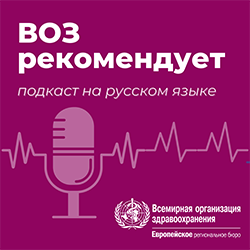WHO/Europe launches a new Russian-language podcast on the hottest health topics

“The how of WHO” (“ВОЗ рекомендует” in Russian) is a new podcast from WHO/Europe. It is tailored specifically to the interests of Russian speakers across the broad and diverse WHO European Region. The aim of the podcast is to explain in simple terms where public health recommendations come from and what an individual can do to stay healthy.
The first episode of the podcast, available on multiple podcast platforms, focuses on the importance of creating smoke-free environments. It includes a discussion with technical experts from WHO/Europe as well as success stories from different countries in the Region. Download and subscribe to the podcast by following the links on the podcast’s homepage below.
Noncommunicable diseases in focus
The first season of the podcast is dedicated noncommunicable diseases (NCDs) (cardiovascular diseases, cancer, diabetes, chronic respiratory diseases and mental health issues) – a relatively small group of health conditions that is responsible for a large part of the disease burden in the European Region.
Of the 6 WHO regions, the European Region is the most affected by NCDs. However, many of these diseases are preventable and are linked by common risk factors – tobacco and alcohol use, unhealthy diets, physical inactivity and high blood pressure. The harm of tobacco use and alcohol consumption, as well as the benefits of healthy eating and physical activity will therefore be key topics highlighted in the podcast.
An insight into WHO work
WHO/Europe promotes a comprehensive approach to tackling NCDs and aims to help countries implement effective programmes and address risk factors. Podcast episodes will explain how WHO/Europe develops recommendations, norms and standards, guidance, and public health tools.
Actions for promotion of health and well-being in countries across the Region are an integral part of the European Programme of Work 2020–2025 – “United Action for Better Health in Europe”. The podcast series will contribute to promoting health and well-being in Russian-speaking countries by raising public awareness of important health issues at the country level.



